Early Donald Trump attacks could hurt Mo Brooks in U.S. Senate race
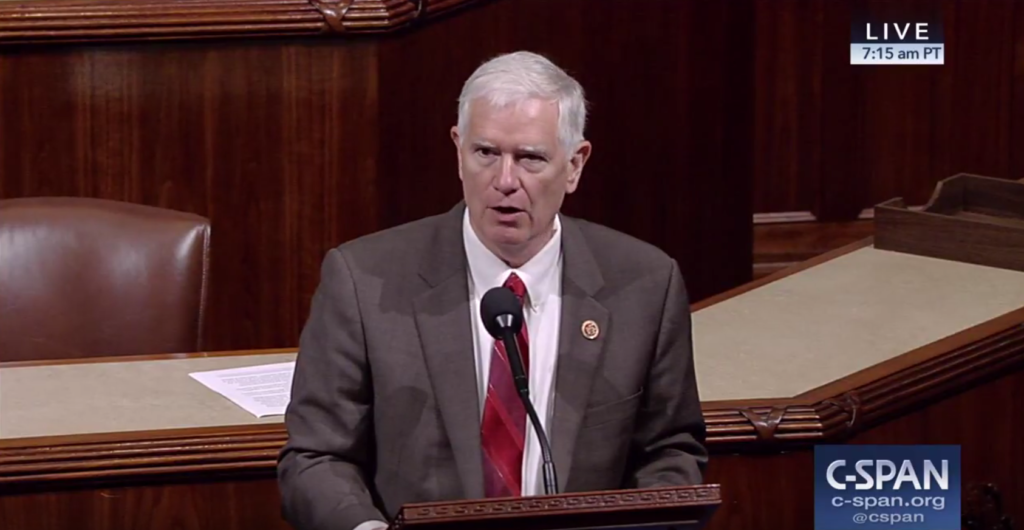
During the 2016 GOP presidential primary, Congressman Mo Brooks called then-candidate Donald Trump a “serial adulterer,” only offering tepid support for him in the general election. Brooks, now in the middle of a contentious Republican primary for the Alabama U.S. Senate seat once held by Attorney General Jeff Sessions – a key supporter of the president – could struggle because of those attacks on Trump, who won Alabama by nearly 30 points. In the past, Alabama Republicans have turned on GOP lawmakers they see as anti-Trump. Brooks, who is looking to defeat incumbent Sen. Luther Strange to serve the rest of Sessions’ term, could be called to task for his past comments on Trump. The Hill notes that Brooks’ remarks could hurt him in the race against Strange and former Alabama Supreme Court Justice Roy Moore, well-known for his high-profile religious liberty battles. But in an interview with The Hill, Brooks downplayed Trump attacks, saying they were to support for Sen. Ted Cruz’s unsuccessful presidential bid. “When I’m in combat, a political fight, I use all weapons at my disposal, as I’m sure all of the candidates do,” Brooks said. “Once the fight was over with, it was important for our nominee to win the election.” Brooks added: “I’m not going to rehash the arguments I used to try to persuade voters to vote for the candidate of my choice in the primary, Ted Cruz. I will say, right now, Donald Trump is a vastly superior choice to the alternative of Hillary Clinton.” However, that’s a significantly different tone than February 2016, when Brooks told MSNBC a day before the Super Tuesday primaries: “I think what you are going to see 12 to 18 months from now is that a lot of people who have supported Donald Trump, they are going to regret having done so.” “I don’t support people who support adultery, and I don’t trust people who are serial adulterers, as Donald Trump has been and bragged about in writing because I don’t think that is an honorable thing or trait in a person,” he added. Nevertheless, since Trump’s victory, Brooks has become an outspoken supporter. In a speech on the House floor a few weeks after the election, Brooks defended Trump’s unsubstantiated claim that he “won the popular vote if you deduct the millions of people who voted illegally.” “A circus of left-wing media pundits immediately pounced on President-elect Trump’s opinion in an effort to silence serious discussion of the noncitizen voter fraud problem,” Brooks said. This change of heart may not be enough to sway Alabama voters, who already sent a message to Republican U.S. Rep. Martha Roby. Roby had also called for Trump to step aside after the release of the “Access Hollywood” tape where he makes lewd comments about grabbing women. Although Roby eventually won re-election, it was by only nine points – a much narrower margin than expected for her heavily-Republican district, which Trump won by 32 points.
With little fanfare, internal polling gives Roy Moore lead in U.S. Senate race
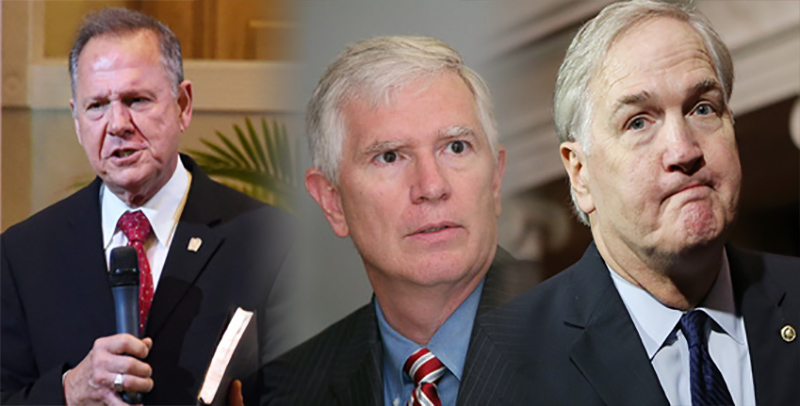
Sometimes, the most money (or pull) does not guarantee a candidate a polling lead. While incumbent Sen. Luther Strange has financial and institutional support, and U.S. Rep. Mo Brooks gathering congressional backing, it is former Alabama Supreme Court Justice Roy Moore leading in the GOP primary for Strange’s Senate seat. As Daniel Strauss of POLITICO reports, Brooks’ internal polling is showing the firebrand ex-judge – who was suspended from the state Supreme Court over his refusal to honor the federal same-sex marriage ruling – leading the Republican primary field of nearly a dozen candidates with 31 percent. Strange is next at 23 percent, with Brooks at 21 percent; other candidates grouped below the 5 percent threshold. Moore has received less attention than his Washington-centric opponents for the Aug. 15 primary for Attorney General Jeff Sessions‘ old Senate seat. “But he could be an unusually strong obstacle for Strange in an age of unsettled Republican primaries,” Strauss writes. “Moore is hoping his years of high-profile religious fights on the Alabama Supreme Court will fuel his run more than a high-budget campaign would have.”
Steve Flowers: Questionable political appointments nothing new
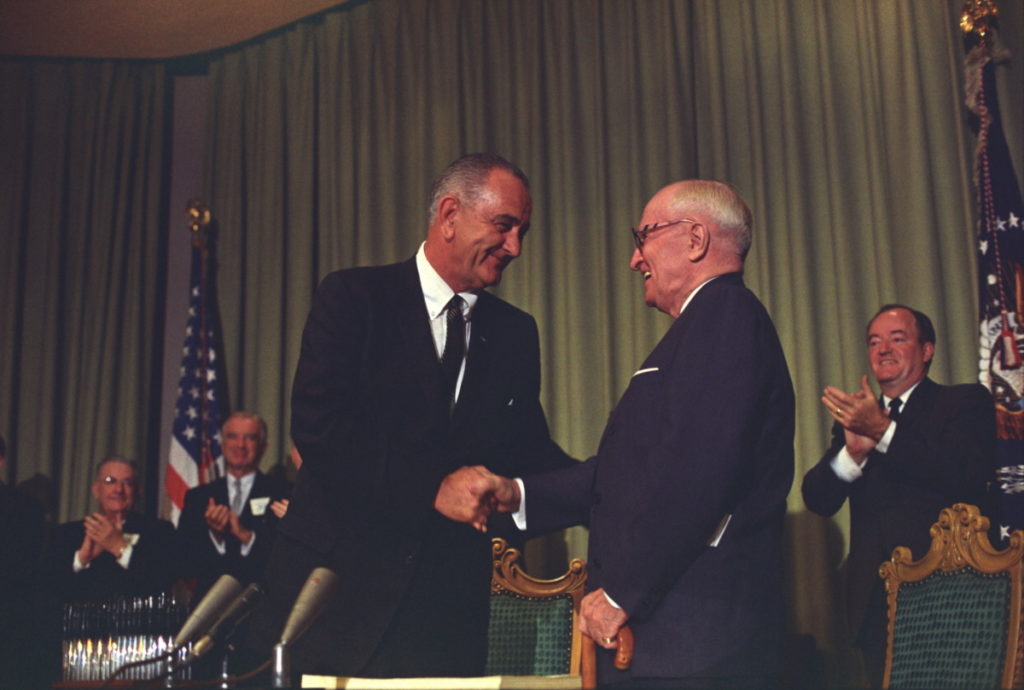
In Alabama politics, many times appointments to political offices filled by an acting governor have an adverse effect on that appointee if and when they seek election to that office for a full term. Every time George Wallace appointed someone to a political post, even in the prime of his popularity and power, they invariably lost in the next election. Well folks, ole Dr. Bentley ain’t George Wallace and his appointment of Luther Strange to the Senate seat vacated by Jeff Sessions may come back to haunt Big Luther. His appointment is even more problematic due to the appearance of collusion surrounding the appointment. The taint of the Bentley appointment hovers over Big Luther’s tall head in Washington. Lyndon Johnson had a similar cloud over his head when he arrived in the U.S. Senate in 1948. It was known that he had stolen the Texas Senate seat when he arrived. When that U.S. Senate seat came open, he made the decision to roll the dice and go for broke. Lyndon did not know that the legendary governor, Coke Stevenson, would enter the race Coke Stevenson was a legendary Texas icon. He was the epitome of a Texas gentleman and revered. He was Texas’ Horatio Alger and Davy Crockett combined. He raised himself from age 12, built a ranching empire, was Speaker of the Texas House of Representatives and a very popular Governor of Texas. Stevenson was above reproach. He would not lie, steal or cheat and Texans knew that about old Coke. On the other hand, Lyndon Johnson had already earned the reputation in Texas that he would continue to earn in Washington — he would do whatever it took to win. He was totally corrupt and ruthless without any semblance of a conscience. Johnson applied modern day politics to that era. He introduced polling and what it meant in detail. He even used a helicopter to fly from town-to-town and land on court squares to speak and shake hands, but mostly he used negative and false campaign mailings to attempt to destroy Stevenson’s stellar reputation. Stevenson was from a different era. He refused to go negative and would not reply to any negative accusations no matter how maliciously false. Johnson was able to utilize this massive media blitz because he had more campaign funds than any candidate in Texas history. He had unlimited financial backing from the giant Brown and Root Company of Texas, which is now Halliburton Corporation. They were then, as they are now, the recipients of gigantic government construction contracts. Johnson was their boy and would do their bidding as their senator so they poured money into the race like water. Johnson outspent Stevenson 10-1, but it was not enough. When the votes were counted on election night, Stevenson had won by a narrow margin. However, the election was not over; Stevenson was about to be counted out. The Rio Grande Valley along the Texas and Mexican border was known as the region where votes could be bought. Most close elections were decided in these counties, which would come in days after the original count with just the right number of votes needed to win the election. This is how Johnson won by only 87 votes in a race where over 1 million votes were cast. Johnson became known as “Landslide Lyndon” in Washington because of this 87-vote victory. It was also an allusion to how he had stolen the seat. Some people think that the nickname “Landslide Lyndon” stems from Johnson’s landslide victory over Barry Goldwater in the 1964 presidential race, but it was actually from the 1948 Texas Senate race. A legendary tale that is attributed to Johnson in this infamous race claims that in the days following the election, while garnering enough votes for victory, Johnson and the political bosses of the Valley counties were going through cemeteries and taking names of dead Mexicans off the tombstones to register voters. They could not decipher one of the names and asked Lyndon what to do, Johnson quickly replied, “Give him a name, he’s got as much right to vote as the rest of them in this cemetery.” See you next week ••• Steve Flowers is Alabama’s leading political columnist. His weekly column appears in over 60 Alabama newspapers. He served 16 years in the state Legislature. Steve may be reached at www.steveflowers.us.
Alabama’s GOP Senate hopefuls meet in Oxford for debate
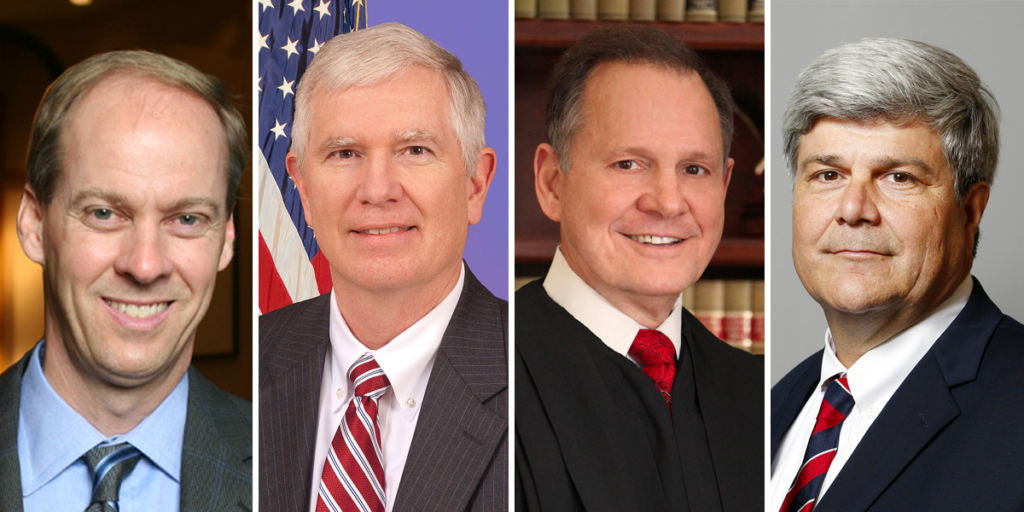
The Calhoun County Republican Party hosted a candidate forum Tuesday night for the state’s GOP Senate hopefuls. Christian Coalition president Randy Brinson, Alabama 5th District U.S. Rep. Mo Brooks, former Chief Justice Roy Moore and state Sen. Trip Pittman were all in attendance for the Oxford, Ala. debate. “We are honored to have the opportunity to host this event, as this is such an important election,” Calhoun County Republican Party Chairman James Bennett said. “This is a great accomplishment for our local party and for our community.” Moderated by radio personality Jay Holland, the debate featured panelists in diverse areas of expertise who queried the candidates throughout the evening, as they jockeyed for support from the crowd. Panelists included: Former Congressman Dr. Glen Browder Professor Emiratis Jacksonville State University. Lt Colonel Brian Reed, U.S. Army Retired, former faculty member West Point Dr. William Lester, Professor Political Science, Jacksonville State University, Fulbright Scholar and published author Larry Huff, Executive Editor of Yellowhammer News, statewide online publication Sen. Luther Strange, who was appointed to the seat in February following its vacancy when Jeff Sessions accepted the U.S. Attorney position, was invited to the forum but was unable to attend.
Steve Flowers: 2018 elections will be one for record books

The much-anticipated 2018 election contests have been pushed back by about three months due to the unanticipated race for Jeff Sessions’ Senate seat. This ongoing contest will occupy the news through late September. It was previously thought that June 6 would be the opening bell since fundraising for next year’s June 5 Primary could begin at that time. However, the bell will probably commence chiming in full force by Labor Day. It will be a year for the record books. The ballot will be so long that it will take most folks 15 minutes to vote. We will have an open governor’s race with at least six to nine viable candidates. That same number of folks will be in the open Lt. Governor’s race. You will have a hotly contested open race for Attorney General. There will be five seats up for election on the state Supreme Court. There will be a fight among two sitting Justices, Tom Parker and Lyn Stuart, for Chief Justice, all Probate Judges, and many Circuit and District Court Judges in the State will be running as well as all 67 Sheriffs. However, the most money will be spent on the 35 State Senate races and 105 State House seats. In recent years, special interest money in Montgomery has gravitated more than ever to legislative races. The 2018 legislative money raising could begin June 6, but the jockeying and final decision-making will be delayed by not only the U.S. Senate race. There is also a large cloud of uncertainty as to how the districts will look when all is said and done by the federal courts. In January a three-judge federal panel struck down the current district maps drawn in 2012. The three federal judges were following precedent sent down from the U.S. Supreme Court. Alabama Democrats led by the Alabama Democratic Conference and the Black Legislative Conference prevailed in what appeared to be a “Hail Mary” suit. They won at the U. S. Supreme Court level. The high tribunal’s decision said that the Alabama Republican legislature had intentionally moved Black voters who overwhelmingly vote Democratic into loaded majority-minority districts that made it difficult to form alliances with like-minded white voters. This new theory embraced by the courts advised that it muted minority voices in the political process. The court is right about that. Democratic Senators and Representatives have been run over repeatedly over the last six years by the Republican majority. They have treated them with irrelevance and irreverence. The courts told the legislature to fix the lines to suit the Court order. The Republicans ignored the Court and ran over the Democrats again in the regular session. All of the black Democrats voted against the plan. The most contentious issue was over local politics. The Republicans’ maps gave Republicans a one-seat advantage in the House and Senate delegations in Jefferson County. They brought in GOP legislators who live in the suburbs surrounding Birmingham to give them a majority in the demographically Democratic County. The Courts were essentially ignored in favor of politics. The GOP supermajority continued to use the whip handle with the Democrats. However, they are not holding the cards in this poker game. When the Court hears the case in September, the GOP plan will be discarded. The court may wind up drawing the new districts that legislators run under in 2018. The last time the courts drew the lines was in 1983. In that case, the judges sent the demographics and judicial requirements to cartography experts in New York and they fed them into a computer. The Court ordered computer drawn districts that had no regard for county line boundaries or political enclaves, much less protecting incumbents. Several GOP legislators may wake up one morning in October and see that the Courts have put them in the same districts. Therefore, most lobbyists and special interests are keeping their powder dry. They will probably not be doling out large legislative donations until qualifying time around the first of the year. The most hotly contested state Senate race will be for the Dick Brewbaker seat in the Montgomery River Region. Brewbaker is not running for re-election. Most insiders expect Senator Harri Ann Smith to retire from her Houston/Geneva Wiregrass seat. Regardless, popular Dothan mayor, Mike Schmitz, is not running for a third term as mayor and is expected to run for that State Senate seat. We will see. See you next week. ___ Steve Flowers is Alabama’s leading political columnist. His weekly column appears in over 60 Alabama newspapers. He served 16 years in the state Legislature. Steve may be reached at www.steveflowers.us.
Birmingham among 12 cities that will get federal help to fight violent crime
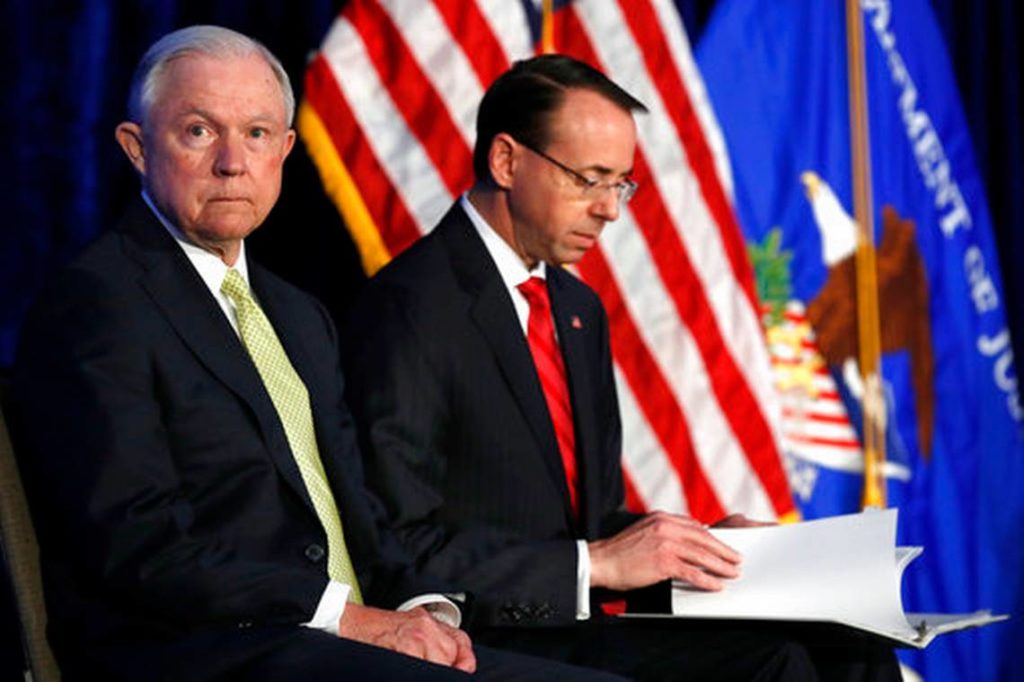
The U.S. Justice Department (DOJ) announced Birmingham is among the 12 cities that will receive federal aid to help fight violent crime. DOJ said Tuesday the new National Public Safety Partnership, dubbed “PSP,” initiative comes on the heels of President Donald Trump‘s February executive order on public safety. The partnership provides a framework for enhancing federal support of state, local and tribal law enforcement officials and prosecutors as they aggressively investigate and pursue violent criminals, specifically those involved in gun crime, drug trafficking and gang violence. News of its formation came before the opening session of a national summit organized by the Attorney General’s Task Force on Crime Reduction and Public Safety. “Turning back the recent troubling increase of violent crime in our country is a top priority of the Department of Justice and the Trump Administration, as we work to fulfill the president’s promise to make America safe again,” Attorney General Jeff Sessions said in a statement. According to the DOJ, the initial 12 cities are that ones need “significant assistance” in combating “gun crime, drug trafficking and gang violence.” “The Department of Justice will work with American cities suffering from serious violent crime problems. There is no doubt that there are many strategies that are proven to reduce crime,” Sessions continued. “Our new National Public Safety Partnership program will help these communities build up their own capacity to fight crime, by making use of data-driven, evidence-based strategies tailored to specific local concerns, and by drawing upon the expertise and resources of our Department.” The 12 cities that have been selected are: Birmingham, Ala.; Indianapolis, In.; Memphis, Tenn.; Toledo, Ohio; Baton Rouge, La.; Buffalo, NY; Cincinnati, Ohio; Huston, Texas; Jackson, Tenn.; Kansas City, Mo; Lansing, Mi; and Springfield, Ill.
Steve Flowers: Sorting out ‘unforeseens’ in Alabama Governor’s race

Those of us who follow Alabama politics had circled June 6, 2017, as the beginning of the 2018 governor’s race. However, we did not foresee Donald Trump’s election as President in November and the subsequent appointment of our U.S. Senator, Jeff Sessions, as his Attorney General, thus, opening a U.S. Senate seat and causing the need for an unanticipated special election for the open Senate seat this year. Therefore, the race for Sessions’ Senate seat will dominate the political news for at least the next three months. This Senate seat race has pushed back the timetable for gubernatorial aspirants by about three months. The thoroughbreds who might enter the Derby for the Brass Ring of Alabama politics probably have the luxury of waiting until Labor Day or maybe after the Sept. 26 GOP runoff for U.S. Senator. However, they do need to declare by Oct. 1, because qualifying will begin in late November for next year’s June 5 Primary. Also, we did not anticipate the resignation of Gov. Robert Bentley April 10 and the ultimate elevation of Lt. Gov., Kay Ivey, to Governor. Kay Ivey has been governor for less than three months; however, she has taken to the post like a “duck to water.” She has been deliberative and decisive and looks very gubernatorial. She is slowly putting her people into Cabinet posts. Enterprise Mayor, Ken Boswell, is a good choice for ADECA Director. This is a prime post as it doles out all the Federal grants that come to the state for infrastructure projects. She has named Christopher Blankenship acting Commissioner of Conservation and Natural Resources. She has removed Serve Alabama Director Jon Mason, and Alabama Law Enforcement Agency Secretary, Stan Stabler. Her two closest advisors throughout her career have been Steve Pelham and Will Sellers. She has brought Pelham with her as her Chief of Staff. She has appointed Will Sellers to a vacant seat on the state Supreme Court. Pelham will be the most important person in state government for at least 18 months. These unforeseen events have changed the political landscape dramatically when it comes to the 2018 governor’s race. This time last year, Roy Moore and Luther Strange were two of the lead horses for governor. They are now the two frontrunners for the open Senate seat. Win or lose they are removed from the governor’s race. Kay Ivey’s elevation to governor has made her the favorite at this time. However, as this past year’s events reveal, a lot can change in a year’s time. As we assess the field with less than a year to the finish line, Kay Ivey is the linchpin of the race. She is the incumbent. She has good name identification and her age, 72, is an advantage and not a disadvantage. She looks like your grandmother. That sells better than young and glamorous, especially among female voters. They can identify and feel comfortable with Kay. Currently, Kay is in the proverbial catbird’s seat. The million-dollar question is does Kay really want to run for a full four-year term. If she were to ask me as a friend, I would tell her no. If I were her, I would not want to go through the rigors of a yearlong campaign. She can go to the house and proudly say that she was Governor of Alabama. A 20-month tenure as governor is not an insignificant amount of time. There are four significant thoroughbreds in the race, regardless of Ivey’s intentions. PSC President, Twinkle Cavanaugh, 50, is popular and well positioned. She has won three statewide races. Agriculture Commissioner, John McMillan, 75, has been at his important post for eight years. He has done an exemplary job. However, he cannot run again. He is well-liked. Huntsville Mayor, Tommy Battle, 61, will be a player in the governor’s race. He is the popular Mayor of Alabama’s economic crown jewel. Jefferson County Commissioner, David Carrington, 69, could be a factor. He has some name recognition from being seen often in the all-important Birmingham media market. If he gets strong support from the Birmingham suburbs, he could be a dark horse. Birmingham-based evangelist, Scott Dawson, 49, might catch fire. Tuscaloosa’s popular young mayor, Walt Maddox, may make the gubernatorial plunge as a Democrat. We will see. See you next week. ___ Steve Flowers is Alabama’s leading political columnist. His weekly column appears in over 60 Alabama newspapers. He served 16 years in the state Legislature. Steve may be reached at www.steveflowers.us.
Alabama delegation reacts to Jeff Sessions testimony on Russia
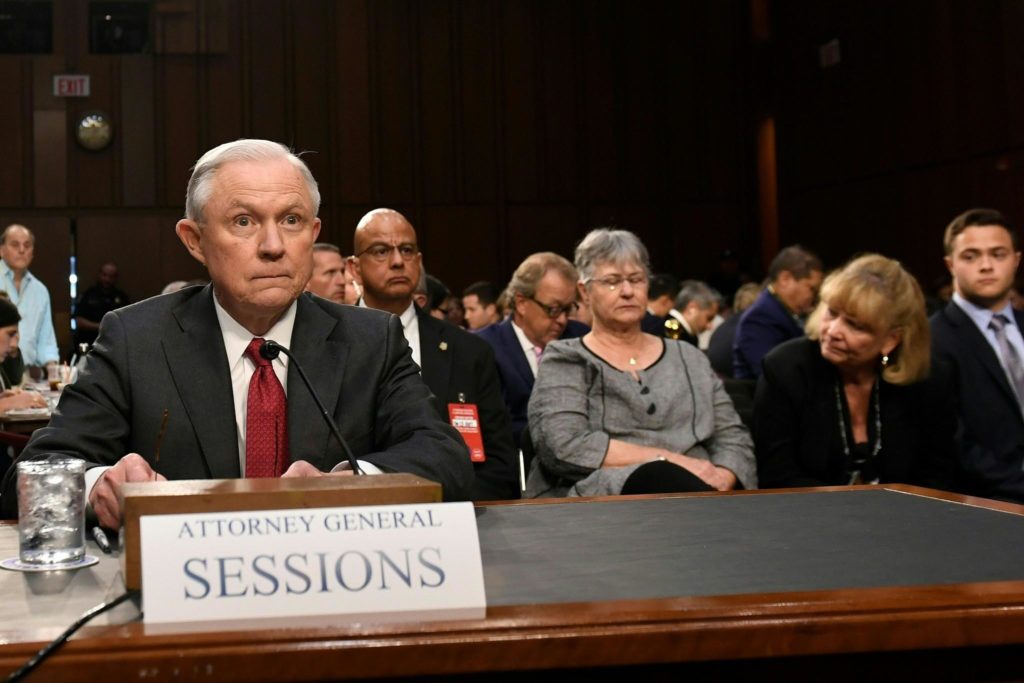
Former Alabama U.S. Senator and current U.S. Attorney General Jeff Sessions appeared Tuesday at a public hearing before the Senate Select Committee on Intelligence to testify in the ongoing investigation into Russian tampering in the 2016 presidential election. Sessions’ hearing follows fired FBI Director James Comey‘s. Comey testified before the same committee less than a week ago. During the highly contentious hearing, Sessions said any suggestion he colluded with Russians during the election was an “appalling” lie. “Please, colleagues, hear me on this,” he said. Here’s what the Alabama delegation thought of their former Congressional colleague’s testimony: Sen. Luther Strange: My friend Jeff Sessions demonstrated today why the people of Alabama trust him and why President Donald Trump chose him to be our Attorney General – a complete commitment to integrity, transparency and the rule of law. I trust the bipartisan Senate Intelligence Committee to finish this investigation swiftly and allow Congress to return to the business of implementing President Trump’s agenda to repeal Obamacare, reform our tax code, rebuild our military and rollback red-tape. Alabama 1st District U.S. Rep. Bradley Byrne: I am not at all surprised that the Jeff Sessions who testified today was the same Jeff Sessions I have known for almost forty years. He was honest, knowledgeable of the law, direct, and professional. I continue to have complete confidence and trust in him as he serves as our Attorney General. Alabama 2nd District U.S. Rep. Martha Roby: I applaud Attorney General Sessions for testifying publicly before the Senate Intelligence Committee. I’m glad he took the opportunity to forcefully defend himself and set the record straight amid unfair partisan attacks. I have always known Attorney General Sessions to be a man of the highest integrity, and he demonstrated that today. Alabama 3rd District U.S. Rep. Mike Rogers: Thank goodness for Jeff Sessions. He is a man of the highest integrity and honesty. The American people heard the truth today. Now it’s time for the liberal media elite and the Democrats to stop their frivolous attacks on President Trump so we can start the people’s work. Alabama 4th District U.S. Rep. Robert Aderholt: Jeff Sessions testimony showed that he is not far removed from the Eagle Scout who grew up in Camden, Alabama. His testimony today was honest, open and direct. And just as the Scout oath says, I believe Sessions will continue to do his duty to God and to his country. If there is anything there, I certainly believe we need to get to the bottom of the attempts by the Russian government to influence our election process. However, I have still not seen a single piece of evidence that Russian interference changed a single vote back on November 8th and certainly not thousands of votes that were cast for Mr. Trump in Pennsylvania, Michigan and Wisconsin. Alabama 5th District U.S. Rep. Mo Brooks: We have clear unambiguous testimony by Attorney General Jeff Sessions that he has in no way, shape, or form colluded with Russians concerning 2016 elections. It is time for the Democrat Party, Democrat elected officials, and the Democrat Communications Wing (the mainstream news media) to put up or shut up. If any of them have evidence – not hearsay, not gossip, not partisan-motivated lies – that conflicts with Attorney General Jeff Sessions’ sworn testimony, they must produce it or quit assassinating his character so that we can put this matter behind us. The American people deserve far better than the innuendo and falsities Democrats spread in a hyper-partisan effort to impugn the honor and integrity of Jeff Sessions, one of Alabama’s best. Alabama 6th District U.S. Rep. Gary Palmer: While I was unable to hear Attorney General Jeff Sessions’ testimony before the Senate Intelligence Committee, I am confident that he is a man of highest character and has conducted himself with the highest integrity. Attorney General Jeff Sessions has spent practically his entire career serving the people of the United States, first as a U.S. Attorney then as a U.S. Senator and now as Attorney General, and working faithfully to uphold the rule of law. Alabama 7th District U.S. Rep. Terri Sewell: Did not respond to request for comment
Jeff Sessions to face sharp questions on Russia contacts
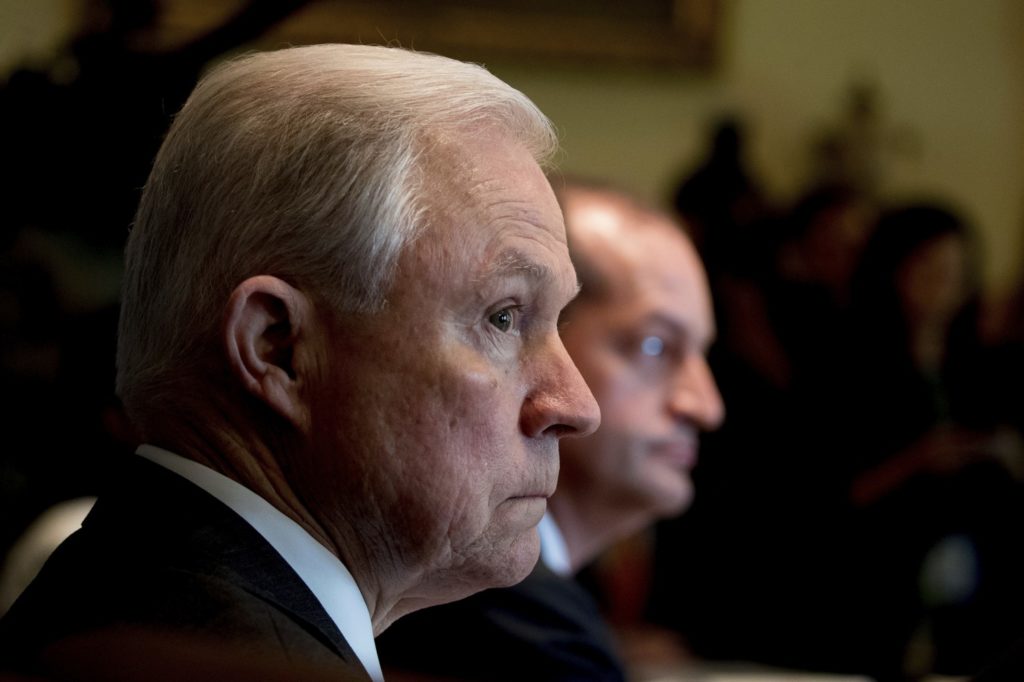
Attorney General Jeff Sessions is preparing for sharp questions from his former Senate colleagues about his role in the firing of James Comey, his Russian contacts during the campaign and his decision to recuse himself from an investigation into possible ties between Moscow and associates of President Donald Trump. The public testimony Tuesday before the Senate intelligence committee should yield Sessions’ most extensive comments to date on questions that have dogged his entire tenure as attorney general and that led him three months ago to step aside from the Russia probe. Lawmakers for weeks have demanded answers from Sessions, particularly about meetings he had last summer and fall with the Russian ambassador to the United States. Those calls have escalated since fired FBI Director James Comey cryptically told lawmakers on Thursday that the bureau had expected Sessions to recuse himself weeks before he did from an investigation into contacts between Trump campaign associates and Russia during the 2016 presidential election. Sessions, a close campaign adviser to Donald Trump and the first senator to endorse him, stepped aside from the investigation in early March after acknowledging he had spoken twice in the months before the election with the Russian ambassador. He said at his January confirmation hearing that he had not met with Russians during the campaign. Since then, lawmakers have raised questions about a possible third meeting at a Washington hotel, though the Justice Department has said that did not happen. Sessions on Saturday said he would appear before the intelligence committee, which has been doing its own investigation into Russian contacts with the Trump campaign. There had been some question as to whether the hearing would be open to the public, but the Justice Department said Monday he requested it be so because he “believes it is important for the American people to hear the truth directly from him.” The committee shortly after said the hearing would be open. The hearing will bring contentious questioning for Sessions and likely some uncomfortable moments for the Trump administration. Sessions is likely to be asked about his conversations with Ambassador Sergey Kislyak and whether there were more encounters that should have been made public. And he can expect questions about his involvement in Comey’s May 9 firing, the circumstances surrounding his decision to recuse himself from the FBI’s investigation, and whether any of his actions — such as interviewing candidates for the FBI director position or meeting with Trump about Comey — violated his recusal pledge. Asked Monday if the White House thought Sessions should invoke executive privilege to avoid answering questions about his conversations with Trump, presidential spokesman Sean Spicer replied, “It depends on the scope of the questions. To get into a hypothetical at this point would be premature.” He did not explicitly endorse Sessions’ appearance, saying in response to a question, “We’re aware of it, and we’ll go from there.” Comey himself had a riveting appearance before the same Senate panel last week, with some key moments centered on Sessions. Comey said Trump told Sessions and other administration officials to leave the room before Trump asked him in February to drop a probe into former National Security Adviser Michael Flynn’s contacts with Russia. In addition, Comey has said Sessions did not respond when he complained that he did not want to be left alone with Trump again. The Justice Department has denied that, saying Sessions stressed to Comey the need to be careful about following appropriate policies. The former FBI director also testified that he and the agency had believed Sessions was “inevitably going to recuse” for reasons he said he could not elaborate on. “We also were aware of facts that I can’t discuss in an open setting that would make his continued engagement in a Russia-related investigation problematic,” Comey said. Sessions’ appearance before the intelligence committee is an indication of just how much the Russia investigation has shaded his tenure. White House frustrations with the Justice Department spilled into public view last week, when Trump on Twitter criticized the legal strategy in defending his proposed travel ban. Spicer, the spokesman, declined to say then that Sessions enjoyed Trump’s confidence, though spokeswoman Sarah Huckabee Sanders said later in the week that the president had confidence “in all of his Cabinet.” Though the Justice Department maintains that it has fully disclosed the extent of Sessions’ foreign contacts last year, lawmakers have continued to press him for answers about an April 2016 event at the Mayflower Hotel in Washington, where both Sessions and Kislyak attended a foreign policy speech by Trump. Senate Democrats have raised the possibility that Sessions and Kislyak could have met there, though Justice Department officials say there were no private encounters or side meetings. Lawmakers, including Al Franken of Minnesota and Patrick Leahy of Vermont, have asked the FBI to investigate and to determine if Sessions committed perjury when he denied having had meetings with Russians. Republished with permission of The Associated Press.
House Freedom Caucus endorses Mo Brooks for U.S. Senate
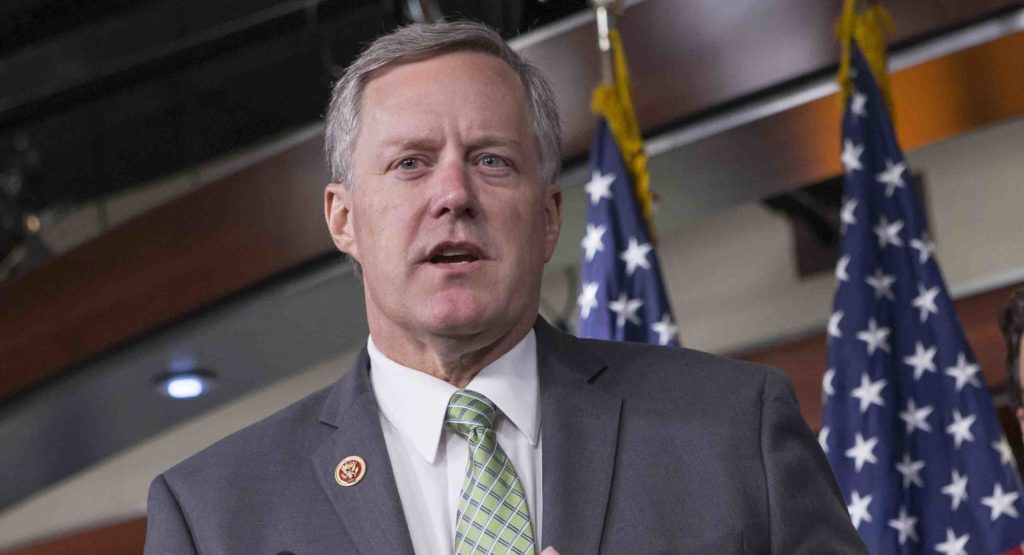
North Carolina Republican Rep. Mark Meadows, who chairs the House Freedom Caucus, is endorsing Congressman Mo Brooks in Alabama’s U.S. Senate Special Election. Breitbart News is reporting on an email sent this week by Brooks’ campaign touting Meadows’ support: “Mo Brooks is a fighter. He has the most conservative voting record in the Alabama congressional delegation. He’s got an A-rating from Numbers USA and the NRA. He has proven himself to be a proven constitutional conservative in the mold of Ted Cruz, Mike Lee, Rand Paul and Ben Sasse.” “We need more like him in the Senate,” Meadows said, adding: “Mo is a battle-tested conservative who is committed to restoring America’s greatness … “The establishment sees Mo as a real threat. They would like nothing better than to see Mo defeated and they’re pulling out all the stops to make sure he doesn’t win … “The road our country has been on these last several years is simply not sustainable. We need conservatives who will go to the Senate and be a part of the fight–not part of the club.” “I’m all in to help Mo Brooks defeat the DC establishment and send him to the Senate. I hope you are too,” the email concludes. Jeff Sessions previously held the Senate seat, before becoming U.S. Attorney General. Then-Gov. Robert Bentley appointed former Alabama Attorney General Luther Strange, with newly named Gov. Kay Ivey announcing an Aug. 15 primary, with a general election Dec. 12. Nine other Republicans are in the running, including incumbent Strange, former Alabama Supreme Court Chief Justice Roy Moore, State Sen. Trip Pittman, and Christian Coalition head Randy Brinson. Democratic candidates include former U.S. Attorney Doug Jones. If there is no majority winner in the Aug. 15 primary, a runoff will be Sept. 26. The winner of the Republican primary will likely win the general election, given the state’s electoral history.
Jeff Sessions to appear before Senate Intelligence committee on Russia meetings
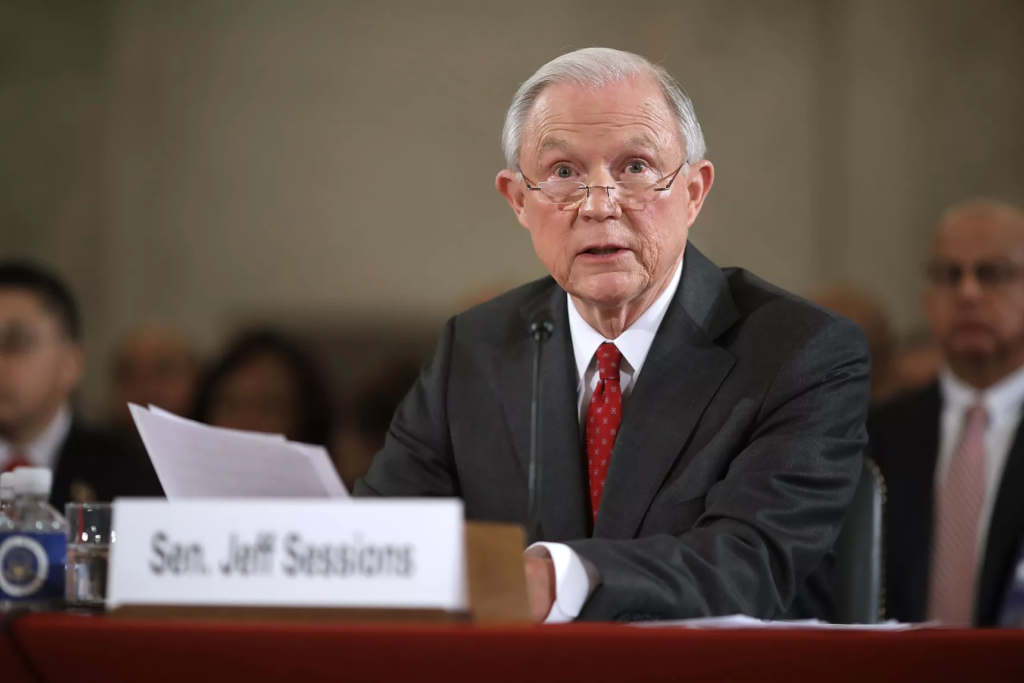
The Latest on President Donald Trump and the investigation into his campaign’s potential ties to Russia (all times local): 8:30 a.m. President Donald Trump is predicting that former FBI Director James Comey‘s “leaks will be far more prevalent than anyone ever thought possible.” Trump says on Twitter, “Totally illegal? Very ‘cowardly!’” Trump is again challenging Comey after the ousted FBI director’s testimony before the Senate Intelligence Committee last week. While many of Trump’s Republican allies have found Comey’s testimony credible, the president has called the man he fired a liar and a “leaker.” Comey said during his testimony that he asked a friend to release contents of the memos he’d written about his conversations with the president to a reporter. He contended that information was not classified or otherwise protected. — 2:45 a.m. Attorney General Jeff Sessions has agreed to appear before the Senate Intelligence Committee. The former Alabama senator was an early supporter of Donald Trump, and Sessions’ contacts during the campaign with Russia’s ambassador to the United States have raised questions. Back in March, Sessions stepped aside from overseeing a federal investigation into contacts between Russia and the Trump campaign after he acknowledged meeting twice last year with the Russian diplomat, Sergey Kislyak. Sessions had told lawmakers at his confirmation hearing in January that he hadn’t met with Russians during the campaign. Sessions has been dogged by questions about possible additional encounters with the ambassador. Republished with permission of The Associated Press.
Darryl Paulson: Will Donald Trump be dumped? – The 25th Amendment
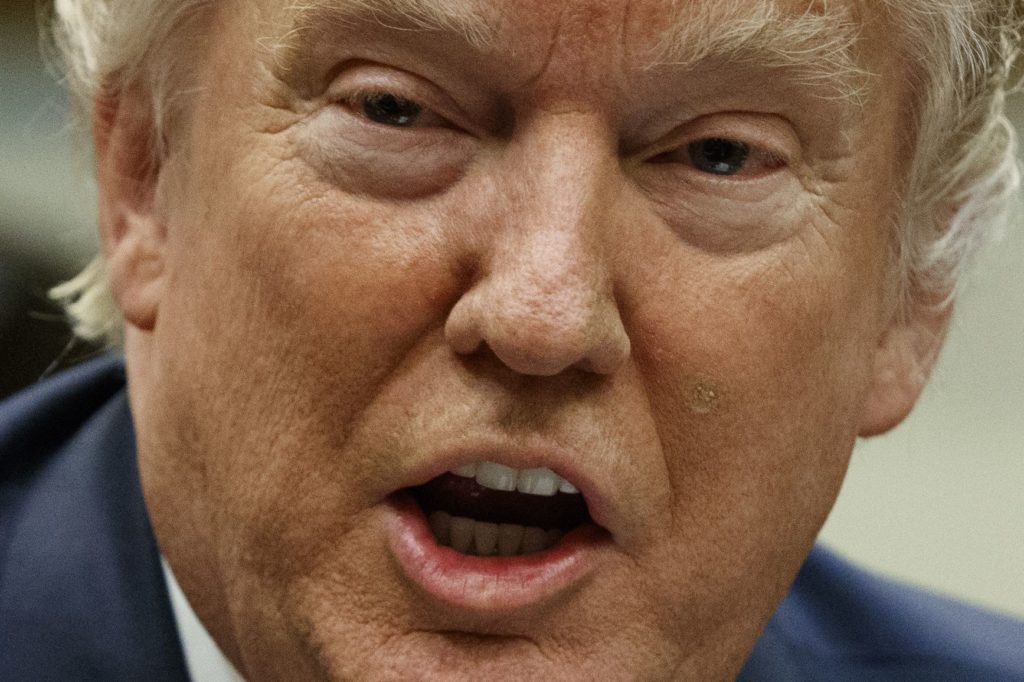
Each day seems to bring more trouble for President Donald Trump. He fired his National Security Adviser Michael Flynn after just three weeks in his position. Then came the firing of FBI Director James Comey. Numerous other individuals in his administration are supposedly on the chopping block, ranging from Press Secretary Sean Spicer to Chief-of-Staff Reince Priebus to Attorney General Jeff Sessions. The FBI investigation of Russian influence in the 2016 election discovered that at least five members of the Trump administration or campaign team had met with Russian officials. Many had failed to disclose these meetings as was required. Before firing Comey, Trump asked the FBI Director on several occasions to pledge his loyalty to the president. Comey promised his “honesty,” but failed to pledge his loyalty. Trump also asked Comey to drop his investigation of Flynn because he is a “good guy.” When Trump fired Comey, he called him a “nut job,” and threatened Comey that he better “hope that there are no ‘tapes’ of our conversation.” Trump also stated that Comey was a bad administrator of the FBI and had lost the support of his colleagues. Finally, Trump said the firing of Comey was done to relieve pressure on the Russian investigation which Trump called “a made-up story.” There is a growing national discussion of removing Trump as president either through the provisions of the 25th Amendment or through impeachment. Neither approach would be easy. Both the 25th Amendment and impeachment raise the specter of a “constitutional coup.” After only six months in office, how will the American public react to what looks like an attempt to nullify the results of the recent presidential election? The 25th Amendment was added to the Constitution in February 1967 and was the result of the assassination of President Kennedy. The Constitution did not provide a means to replace the vice president when he assumed office on the death of the president. There was also no mechanism to remove the president due to disability temporarily or permanently. The vice president and a majority of the cabinet could remove the president if they found him “unable to discharge the powers and duties of his office.” It could also occur if a congressionally appointed body of experts concluded the president was no longer capable of performing his duties. If the president opposes his removal, Congress has three weeks to debate and decide the issue. It requires a two-thirds vote of both houses to remove the president and there is no appeal. The 25th Amendment has been invoked six times since its ratification. On Oct. 12, 1973, Vice President Spiro Agnew resigned and was replaced by Gerald Ford. Ford was confirmed 92-3 by the Senate and 387-35 by the House. The following year, President Richard Nixon resigned the office of president due to Watergate. Ford assumed the presidency on the same day that Nixon resigned, Aug. 9, 1974. Ford became the only person to be both vice president and president without being elected to the positions. On Sept. 20, 1974, President Ford selected Nelson Rockefeller as his vice president. Rockefeller was confirmed 90-7 by the Senate and 287-128 by the House. Three incidents involve the 25th Amendment and presidential disability. On July 12, 1985, President Reagan underwent a colonoscopy and transferred power to Vice President George H.W. Bush for several hours. In 2002 and 2007, President George W. Bush transferred power to Vice President Dick Cheney during two colonoscopies. The presidential disability provisions were considered twice during the Reagan administration but were rejected. On March 30, 1981, President Ronald Reagan was shot by a deranged assassin. Reagan was incapable of turning over powers to his vice president, and vice president Bush decided not to invoke the powers even though Reagan was not capable of governing for several days. In 1987, outgoing Chief Donald Regan warned incoming Chief-of-Staff Howard Baker to be ready to invoke the 25th Amendment. Regan and other staff members were concerned that the president was disengaged from his duties and spent much of his time watching movies. Baker summoned close aides to the president and they all agreed to carefully monitor the president at a luncheon meeting the following day. The president was alert and funny and Baker considered the debate over. “This president is fully capable of doing his job.” One of the concerns over the 25th Amendment is its potential for misuse. In 1964, three years prior to the adoption of the 25th Amendment, 1,000 psychologists said Republican presidential candidate Barry Goldwater was not psychologically fit to be president. Goldwater sued and won. In 1973, the American Psychological Association adopted the “Goldwater Rule,” barring members from making a diagnosis without doing an in-person exam. The Goldwater Rule did not stop 50,000 mental health professionals from signing a petition stating that Trump is “too seriously mentally ill to perform the duties of president and should be removed under the 25th Amendment.” I suspect these “liberals” let their politics get in the way of science, much like Republicans do with climate change. Responding to a letter to The New York Times from a retired Duke psychology professor that Trump was a “malignant narcissist,” an Emeritus professor at Duke Medical School responded that Trump “may be a world-class narcissist, but that doesn’t make him mentally ill. … The antidote is political, not psychological.” Finally, Jeff Greenfield of CNN, commented that attempts to remove Trump under the 25th Amendment for mental health reasons are a “liberal fantasy.” Part II: Will Trump be dumped? Impeachment. ___ Darryl Paulson is Emeritus Professor of Government at USF St. Petersburg specializing in Florida politics and elections.


